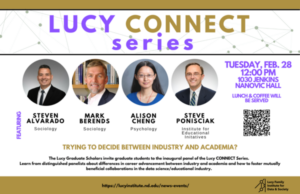
Following the success of the Data & Technology Panel hosted last semester, the Lucy Graduate Scholars held the second event in the Lucy CONNECT series on February 28th, 2023. This second event focused on Data & Education and included Dr. Ying (“Alison”) Cheng, Dr. Steven Alvarado, Dr. Mark Berends, and Dr. Steve Ponisciak, as panelists.
Like the first event, the goal of the panel was to connect graduate students across all disciplines with academic and industry leaders in various data-driven fields. Additionally, the panel aimed to discuss the difference between working in academia and industry, as well as how important it is to form collaborations between the two. Topics included the advantages and disadvantages of working in academia versus industry, work-life balance and job flexibility, as well as advice and helpful resources for graduate students interested in pursuing these careers.
The discussion began by emphasizing the various academic and professional paths each panelist took to get to their current position. Dr. Cheng, who earned a Ph.D. in Quantitative Psychology, started her career in academia and has been working at Notre Dame for the past fifteen years.
She highlights how her experience with industry mostly comes from two sources:
“…I had three internships during my graduate school – was mostly with nonprofit organizations such as College Board and ACT. And then, after I started my job here, I maintained a lot of collaborations with these testing organizations and some of the licensure and certification examination boards. For example, the National State Boards of Nurses. I work closely with them to look at the exam called NCLEX, which is the exam you need to take and pass to be a registered nurse.”
Conversely, Dr. Berends started his career trajectory with industry. After graduating with his Ph.D. in Sociology, Dr. Berends, “ended up getting a job at the Rand Corporation,” which is an independent research institute that informs decision making. After working at Rand for ten years, he then transitioned to academia, and eventually found his home at Notre Dame, “which is the longest I’ve been anywhere.”
Reflecting on the differences and similarities between academia and industry, the panelists highlight structure versus flexibility. Dr. Cheng notes how industry is, “a lot more structured. People are giving you deadlines on things. They’re telling you what projects you need to be finishing up…But there are a lot of structures for you.” Conversely, she notes that, “if you’re in an academic job you have to set up that structure for yourself. There’s no one telling you, ‘You definitely need to be finishing up this chapter by the end of the month there may be a deadline.’”
Dr. Ponisciak, who earned a Ph.D. in Statistics, similarly notes, “in the education world, outside of academia, for the most part, you would be more focused on the needs of the organization (school district, state DOE, assessment vendor, etc.) rather than on your own research questions.” However, he does mention that, “unless you’re researching your own university, industry has the data. So you need partners with common interests (or partners who are at least willing to engage with you), so you can arrange data sharing agreements, find funding, and do the research.”
The panelists also talked about the benefits of industry-academia collaborations. Drawing from their personal experiences, the panelists explain how, “it was just really stimulating to be on these projects” (Dr. Berends). Dr. Alvarado, who earned a Ph.D. in Sociology, notes the unique advantages that he has while working with the Department of Education; “The data that I’ve been working with since graduate school is a highly restricted data set from the Department of Education…I think that there’s [an] absolute advantage in terms of being able to, you know, investigate certain questions that are important that may not have otherwise been pursued.” Dr. Alvarado’s collaborations with industry has given him the “unique opportunity to analyze questions that are new to the field.”
An audio recording of the event is available on YouTube.
The next event in the Lucy CONNECT Series will center on Data & Health and is scheduled for April 13, 2023 at 11:30 am.
In addition to the Lucy CONNECT Series, the Graduate Lucy Scholars are also hosting a Collaboration Hour Series, and all are welcome to attend. Interested in these events? Click here to join the mailing list to hear about ongoing Lucy events or contact lucyinstitute@nd.edu to get added to the Lucy Graduate Student Slack.
About the Lucy Family Institute for Data & Society
The Lucy Family Institute for Data & Society is a hub for students, faculty, postdoctoral and visiting scholars, and staff to explore how data can be harnessed for societal benefit. We act as an incubator for data research as well as a liaison to the government and business communities. Our mission is to enable a positive impact on society and individual lives through innovative domain-informed and data-driven methods and applications.
